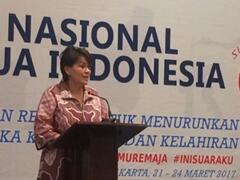YOGYAKARTA, 21 March 2017: At the four-day Youth Summit in Yogyakarta, starting on March 21, speakers called for strengthened youth empowerment and their active engagement in order to tap into their resourcefulness to address youth issues and end poverty.
Early marriage, unintended teenage pregnancies and lack of adolescent sexual and reproductive health (ASRH) education are among the challenges affecting Indonesian young people with present and future implications on their health, education, opportunities for career and empowerment.
With 62 million young people between the ages of 15 and 29 years, Indonesia is at a time of unprecedented population change with a youth bulge that has the potential to reap a demographic bonus if investment in youth is made now. “Investment now in youth's health, education, empowerment and employment can lift millions of lives out of poverty across the country,” UNFPA Representative Dr. Annette Sachs Robertson. She added that a gender transformative approach should be instilled in communities and all young people should have access to sexual and reproductive health information and services, including contraceptives, to make informed choices.
“Young people need comprehensive reproductive health education so they can protect their health and know their rights. Some also need contraception to prevent unwanted pregnancies,” said Wulandari a youth activist, a member of the Indonesian Youth Alliance (ARI).
There are multi-layer barriers at community level that discourage young people in accessing SRH services and information who only go there when they have serious RH issues like STIs, unplanned pregnancies or sexual violence. Monique Soesman from WPFRuttgers called on all stakeholders to work together for innovative solutions to promote ASRH rights. “Comprehensive Sexuality Education (CSE) for early adolescents is pivotal to create awareness and increase demand for services. It should be given before young people become sexually active,” she explained.
Deputy Representative of the UN Children’s Fund (UNICEF) Lauren Rumble said child marriage still happens in some communities. Child marriage is linked to lack of access to SRH services and it preserves poverty. “Ending child marriage is key to achieve SDGs 1, ending poverty,” she said. Studies show that married girls are likely to drop out of school, unable to join the labour force and have low earning; they are less able to invest in their children’s health, education and empowerment.
Representative of Johns Hopkins Center for Communication Program (JHCCP) Fitri Putjuk stressed the need to use evidence-based and accurate data for informed youth policies and programmes. Media involvement is essential to spread ARH information and where to access ARH services.
Building character and competency starts at the family level. Couples need to be ready when deciding to start a family, said Head of National Population and Family Planning Board (BKKBN) Surya Chandra Surapaty. He used the forum to call for stronger collaboration among key stakeholders. “We cannot work in silos. We need to establish strategic partnership to raise awareness, do health promotion and implement programmes to realize youth resilience.”


